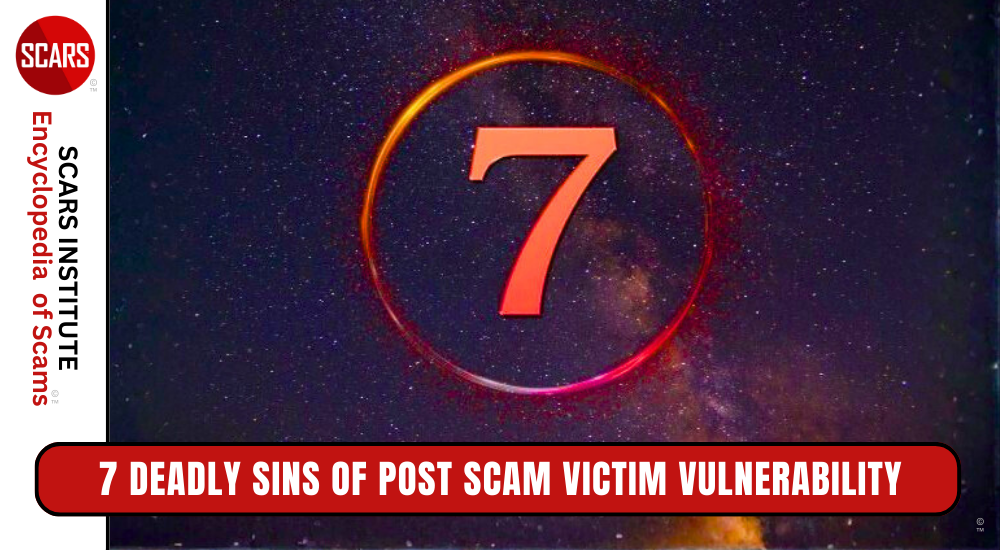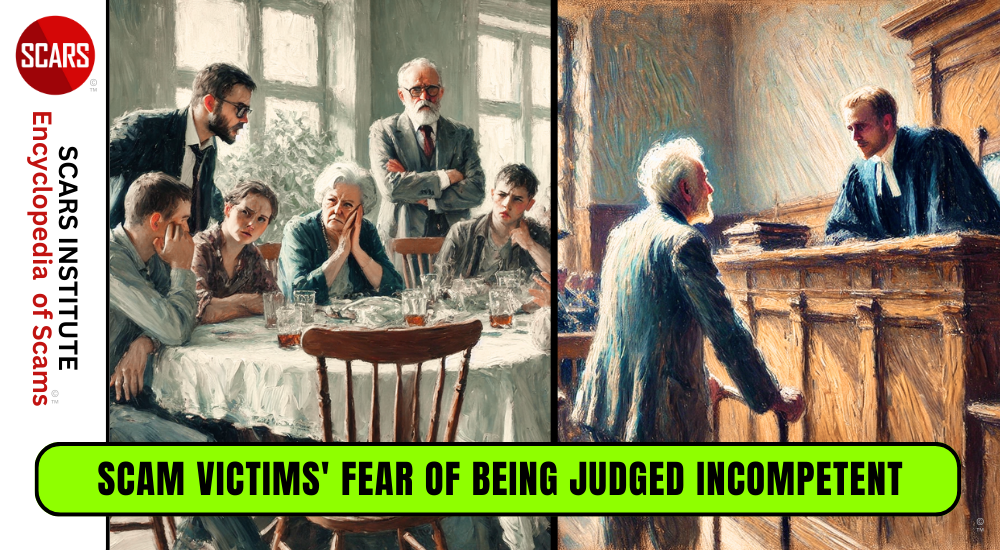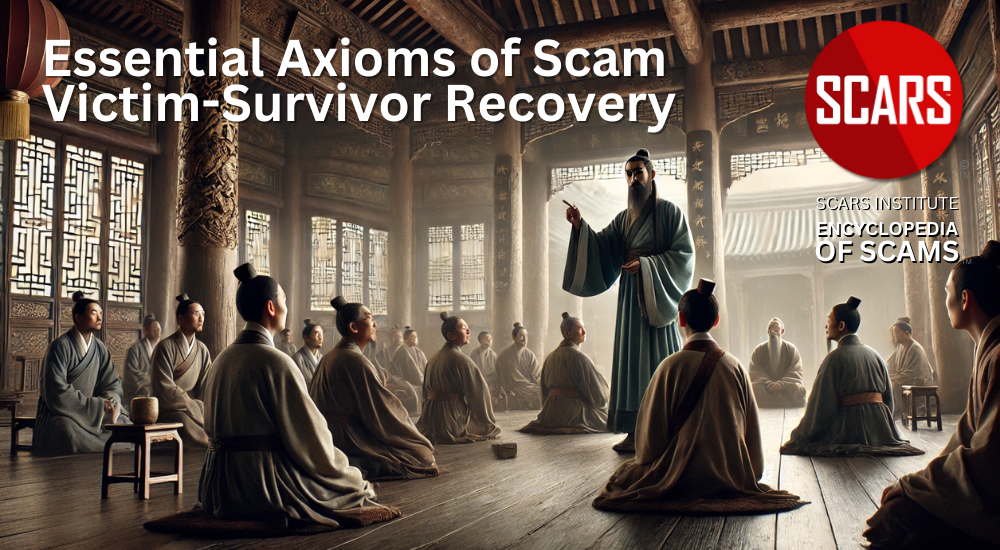
SCARS Institute’s Encyclopedia of Scams™ Published Continuously for 25 Years

10 Steps To Breaking Free & Beginning Your Recovery
SCARS Psychology Of Scams
How To Break Free & Begin Recovery
Extracted and adapted from an article by Sharie Stines, PsyD, GoodTherapy.org – Copyright acknowledged – we thank the author for their scholarship
10 Steps To Breaking Free And Staying Free
Bonds occur in toxic relationships (such as with a romance scammer) and tend to be strengthened by inconsistent positive reinforcement — your hope of something better to come (a happy ending).
These Trauma Bonds occur in situations such as romance scams, abusive relationships, hostage situations, and incestuous relationships, but also in any ongoing attached relationship in which there is a great deal of pain (which can also be self-inflicted) interspersed with times of calm (or maybe just less pain). It is generally recognized as an addiction — the relationship promises much, gives fleeting feelings of utopia, and then it sucks away your very soul.
If you or someone you know has been in a romance scam relationship, you have witnessed the strength of this type of connection. Maybe you or someone you know is trying to get out, but seems incapable of leaving.
Breaking Bonds & Becoming Free
Here is advice on how to break free from this type of stranglehold:
- Make A Commitment To Live In Reality: If you find yourself wanting to fantasize about what could be or what you hope will be, stop. Remind yourself that you have made a commitment to live in truth. Even if you don’t choose to leave the relationship immediately, in the meantime you can at least remind yourself that you will stop fantasizing about what is not happening.
- Live In Real-Time: That means to stop holding on to what “could” or “will” happen tomorrow. Notice what is happening in the moment. Notice how trapped you feel. Notice how unloved you feel and how you have compromised your self-respect and self-worth for this relationship. Pay attention to your emotions. Stop hoping and waiting, and start noticing in real-time what is happening and how it is affecting you.
- Live One Decision At A Time And One Day At A Time: Sometimes people scare themselves with all-or-nothing thinking. Don’t tell yourself things like, “I have to never talk to the toxic person again or else”; this is akin to trying to lose weight by telling yourself you can never eat chocolate again. While it is true that your relationship is an unhealthy one, you don’t need to make every encounter a do-or-die situation. Don’t scare yourself.
- Make Decisions That Only Support Your Self-Care: That is, do not make any decision that hurts you. This goes for emotional “relapses” as well. If you find yourself feeling weak, don’t mentally berate yourself, but rather talk to yourself in compassionate, understanding, and reflective ways. Remind yourself that you are a work in process and life is a journey. Do not make the uncaring decision to mentally beat yourself up. In every encounter you have with the object of your obsession, stop and think about each choice you make. Make choices that are only in your best interest.
- Start Feeling Your Emotions: Whenever you are away from the toxic person in your life and feel tempted to reach out to them for reassurance, stop. Consider writing your feelings down instead. Write whatever comes to you. This may help you to build inner strength. Learn to simply be with your emotions. You don’t need to run from them, hide from them, avoid them, or make them go away. Once you fully feel them, they may begin to subside. Remember: the only way out is through. For example:
- I feel ____.
- I miss ____.
- I wish I could be with ____ right now, but I am going to sit and write my feelings down instead.
- I am going to teach myself how to feel my way through the obsession, rather than turning to ____.”
- Learn To Grieve: Letting go of a toxic relationship and breaking a traumatic bond may be one of the hardest things you ever have to do. You cannot do it without honoring the reality you are losing something very valuable to you.
- Understand The “Hook”: Identify what, exactly, you are losing. It may be a fantasy, a dream, an illusion. Perhaps your partner had convinced you into believing they were going to fulfill some deep, unmet need. Once you can identify what this need (or hook) is, you can get down to the business of grieving. Grieving means (figuratively) holding your hands open and letting it go. You say goodbye to the notion the need you have may never be met. At a minimum, it will not be met by this relationship.
- Write A List Of Bottom-Line Behaviors For Yourself: Possible examples:
- I will not talk to scammers or strangers online.
- I will not argue with someone who has been drinking.
- I will take care of my own finances.
- I will not have conversations with anyone when I feel desperate (or defensive, or obsessive, etc.).Whatever your areas of concern, determine what you need to do to change and make those your bottom-line behaviors.
- Build Your Life: Little by little, start dreaming about your future for yourself (and your children, if you have them); in other words, make dreams that don’t involve your traumatic partner. Maybe you want to go to school, start a hobby, go to church, or join a club. Start making life-affirming choices for yourself that take you away from the toxic interactions that have been destroying your peace of mind.
- Build Healthy Connections: The only way to really free yourself from unhealthy connections is to start investing in healthy ones. Develop new close, connected, and bonded relationships that are not centered on fantasy or drama. Make these your “go-to” people and make sure they are real. It is extremely difficult to heal without support – join a SCARS Support Group. Notice the people in your life who show you loving concern, and care and hang around with them as often as you can. Reach out for professional help as needed.
If you find yourself feeling weak, don’t mentally beat yourself up, but rather talk to your support group and assure yourself in a serious, compassionate, understanding, and reflective ways that you are going to be ok and make it through this. Remind yourself that you are a work in process and life is a journey. You can get through this!
TAGS: SCARS, Information About Scams, Anti-Scam, Scams, Scammers, Fraudsters, Cybercrime, Crybercriminals, Romance Scams, Scam Victims, Online Fraud, Online Crime Is Real Crime, Scam Avoidance, Married Scam Victims, Internet Infidelity, Scam Victim Divorce
PLEASE SHARE OUR ARTICLES WITH YOUR FRIENDS & FAMILY
HELP OTHERS STAY SAFE ONLINE – YOUR KNOWLEDGE CAN MAKE THE DIFFERENCE!
THE NEXT VICTIM MIGHT BE YOUR OWN FAMILY MEMBER OR BEST FRIEND!
By the SCARS™ Editorial Team
Society of Citizens Against Relationship Scams Inc.
A Worldwide Crime Victims Assistance & Crime Prevention Nonprofit Organization Headquartered In Miami Florida USA & Monterrey NL Mexico, with Partners In More Than 60 Countries
To Learn More, Volunteer, or Donate Visit: www.AgainstScams.org
Contact Us: Contact@AgainstScams.org
-/ 30 /-
What do you think about this?
Please share your thoughts in a comment below!
Table of Contents
- SCARS Psychology Of Scams
- 10 Steps To Breaking Free And Staying Free
- Here is advice on how to break free from this type of stranglehold:
- PLEASE SHARE OUR ARTICLES WITH YOUR FRIENDS & FAMILY
- By the SCARS™ Editorial Team
Society of Citizens Against Relationship Scams Inc. - The Issue Of Race In Scam Reporting
Click Here To Learn More!
LEAVE A COMMENT?
Recent Comments
On Other Articles
- Arwyn Lautenschlager on Love Bombing And How Romance Scam Victims Are Forced To Feel: “I was love bombed to the point that I would do just about anything for the scammer(s). I was told…” Feb 11, 14:24
- on Dani Daniels (Kira Lee Orsag): Another Scammer’s Favorite: “You provide a valuable service! I wish more people knew about it!” Feb 10, 15:05
- on Danielle Delaunay/Danielle Genevieve – Stolen Identity/Stolen Photos – Impersonation Victim UPDATED 2024: “We highly recommend that you simply turn away form the scam and scammers, and focus on the development of a…” Feb 4, 19:47
- on The Art Of Deception: The Fundamental Principals Of Successful Deceptions – 2024: “I experienced many of the deceptive tactics that romance scammers use. I was told various stories of hardship and why…” Feb 4, 15:27
- on Danielle Delaunay/Danielle Genevieve – Stolen Identity/Stolen Photos – Impersonation Victim UPDATED 2024: “Yes, I’m in that exact situation also. “Danielle” has seriously scammed me for 3 years now. “She” (he) doesn’t know…” Feb 4, 14:58
- on An Essay on Justice and Money Recovery – 2026: “you are so right I accidentally clicked on online justice I signed an agreement for 12k upfront but cd only…” Feb 3, 08:16
- on The SCARS Institute Top 50 Celebrity Impersonation Scams – 2025: “Quora has had visits from scammers pretending to be Keanu Reeves and Paul McCartney in 2025 and 2026.” Jan 27, 17:45
- on Scam Victims Should Limit Their Exposure To Scam News & Scammer Photos: “I used to look at scammers photos all the time; however, I don’t feel the need to do it anymore.…” Jan 26, 23:19
- on After A Scam, No One Can Tell You How You Will React: “This article was very informative, my scams happened 5 years ago; however, l do remember several of those emotions and/or…” Jan 23, 17:17
- on Situational Awareness and How Trauma Makes Scam Victims Less Safe – 2024: “I need to be more observant and I am practicing situational awareness. I’m saving this article to remind me of…” Jan 21, 22:55
ARTICLE META
Important Information for New Scam Victims
- Please visit www.ScamVictimsSupport.org – a SCARS Website for New Scam Victims & Sextortion Victims
- Enroll in FREE SCARS Scam Survivor’s School now at www.SCARSeducation.org
- Please visit www.ScamPsychology.org – to more fully understand the psychological concepts involved in scams and scam victim recovery
If you are looking for local trauma counselors please visit counseling.AgainstScams.org or join SCARS for our counseling/therapy benefit: membership.AgainstScams.org
If you need to speak with someone now, you can dial 988 or find phone numbers for crisis hotlines all around the world here: www.opencounseling.com/suicide-hotlines
A Note About Labeling!
We often use the term ‘scam victim’ in our articles, but this is a convenience to help those searching for information in search engines like Google. It is just a convenience and has no deeper meaning. If you have come through such an experience, YOU are a Survivor! It was not your fault. You are not alone! Axios!
A Question of Trust
At the SCARS Institute, we invite you to do your own research on the topics we speak about and publish, Our team investigates the subject being discussed, especially when it comes to understanding the scam victims-survivors experience. You can do Google searches but in many cases, you will have to wade through scientific papers and studies. However, remember that biases and perspectives matter and influence the outcome. Regardless, we encourage you to explore these topics as thoroughly as you can for your own awareness.
Statement About Victim Blaming
SCARS Institute articles examine different aspects of the scam victim experience, as well as those who may have been secondary victims. This work focuses on understanding victimization through the science of victimology, including common psychological and behavioral responses. The purpose is to help victims and survivors understand why these crimes occurred, reduce shame and self-blame, strengthen recovery programs and victim opportunities, and lower the risk of future victimization.
At times, these discussions may sound uncomfortable, overwhelming, or may be mistaken for blame. They are not. Scam victims are never blamed. Our goal is to explain the mechanisms of deception and the human responses that scammers exploit, and the processes that occur after the scam ends, so victims can better understand what happened to them and why it felt convincing at the time, and what the path looks like going forward.
Articles that address the psychology, neurology, physiology, and other characteristics of scams and the victim experience recognize that all people share cognitive and emotional traits that can be manipulated under the right conditions. These characteristics are not flaws. They are normal human functions that criminals deliberately exploit. Victims typically have little awareness of these mechanisms while a scam is unfolding and a very limited ability to control them. Awareness often comes only after the harm has occurred.
By explaining these processes, these articles help victims make sense of their experiences, understand common post-scam reactions, and identify ways to protect themselves moving forward. This knowledge supports recovery by replacing confusion and self-blame with clarity, context, and self-compassion.
Additional educational material on these topics is available at ScamPsychology.org – ScamsNOW.com and other SCARS Institute websites.
Psychology Disclaimer:
All articles about psychology and the human brain on this website are for information & education only
The information provided in this article is intended for educational and self-help purposes only and should not be construed as a substitute for professional therapy or counseling.
While any self-help techniques outlined herein may be beneficial for scam victims seeking to recover from their experience and move towards recovery, it is important to consult with a qualified mental health professional before initiating any course of action. Each individual’s experience and needs are unique, and what works for one person may not be suitable for another.
Additionally, any approach may not be appropriate for individuals with certain pre-existing mental health conditions or trauma histories. It is advisable to seek guidance from a licensed therapist or counselor who can provide personalized support, guidance, and treatment tailored to your specific needs.
If you are experiencing significant distress or emotional difficulties related to a scam or other traumatic event, please consult your doctor or mental health provider for appropriate care and support.
Also read our SCARS Institute Statement about Professional Care for Scam Victims – click here to go to our ScamsNOW.com website.


![10 Steps To Breaking Free & Beginning Your Recovery [Updated] TRAUMA BONDING 2021 RSN™ Psychology Of Scams: Trauma Bonding](https://romancescamsnow.com/wp-content/uploads/2021/02/TRAUMA-BONDING-2021.png)
![10 Steps To Breaking Free & Beginning Your Recovery [Updated] Captain Thomas Lindegaard Madsen Captain Thomas-Lindegaard-Madsen](https://romancescamsnow.com/wp-content/uploads/2018/11/Captain-Thomas-Lindegaard-Madsen.png)
![10 Steps To Breaking Free & Beginning Your Recovery [Updated] psychology of scams 10 steaps to breaking free 2021 psychology-of-scams-10-steaps-to-breaking-free-2021](https://romancescamsnow.com/wp-content/uploads/2018/11/psychology-of-scams-10-steaps-to-breaking-free-2021.png)
![10 Steps To Breaking Free & Beginning Your Recovery [Updated] come and join 2 SCARS Institute Scam Survivor's Community portal banner](https://romancescamsnow.com/wp-content/uploads/2025/12/come-and-join-2.png)
![10 Steps To Breaking Free & Beginning Your Recovery [Updated] scars ball 1200x1200 print colors SCARS the Society of Citizens Against Relationship Scams Incorporated](https://romancescamsnow.com/wp-content/uploads/2020/11/scars-ball-1200x1200-print-colors.png)



![Financial Recovery - Avoid Money Triggers - Perspective on Money for Scam Victims - 2023 [UPDATED 2025] Financial Recovery Money Triggers Financial Recovery - Avoid Money Triggers - Perspective on Money for Scam Victims - 2023 [UPDAYED 2025] - on the SCARS Institute RomanceScamsNOW.com - the Encyclopedia of Scams™](https://romancescamsnow.com/wp-content/uploads/2025/06/Financial-Recovery-Money-Triggers.png)
![Why People Blame Scam Victims? Stop Scam Victim Blaming - [UPDATED 2025] Why People Blame Scam Victims 2025 Why People Blame Scam Victims? Stop Scam Victim Blaming - [UPDATED 2025] - on the SCARS Institute RomanceScamsNOW.com - the Encyclopedia of Scams™](https://romancescamsnow.com/wp-content/uploads/2021/11/Why-People-Blame-Scam-Victims-2025.png)

![10 Steps To Breaking Free & Beginning Your Recovery [Updated] SCARS CDN REPORT SCAMEMRS HERE e1697414569935 SCARS-CDN-REPORT-SCAMEMRS-HERE](https://romancescamsnow.com/wp-content/uploads/2018/12/SCARS-CDN-REPORT-SCAMEMRS-HERE-e1697414569935.png?_t=1697414571)
![10 Steps To Breaking Free & Beginning Your Recovery [Updated] NavyLogo@4x 81 U.S. & Canada Suicide Lifeline 988](https://romancescamsnow.com/wp-content/uploads/2023/06/NavyLogo@4x-81.png)

![10 Steps To Breaking Free & Beginning Your Recovery [Updated] niprc1.png1 150x1501 11 10 Steps To Breaking Free & Beginning Your Recovery [Updated] niprc1.png1 150x1501 11](https://scamsnow.com/wp-content/uploads/2025/04/niprc1.png1_-150x1501-11.webp)
Thank you for your comment. You may receive an email to follow up. We never share your data with marketers.